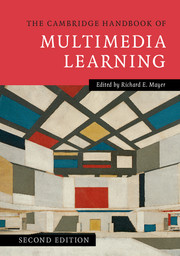Book contents
- The Cambridge Handbook of Multimedia Learning
- The Cambridge Handbook of Multimedia Learning
- Copyright page
- Contents
- Contributors
- Preface
- Acknowledgments
- 1 Introduction to Multimedia Learning
- Part I Theoretical Foundations
- Part II Basic Principles of Multimedia Learning
- Part III Advanced Principles of Multimedia Learning
- Part IV Multimedia Learning of Cognitive Processes
- 26 Multimedia Learning of Cognitive Processes
- 27 Multimedia Learning of Metacognitive Strategies
- 28 Multimedia Learning and the Development of Mental Models
- Part V Multimedia Learning in Advanced Computer-Based Contexts
- Author Index
- Subject Index
27 - Multimedia Learning of Metacognitive Strategies
from Part IV - Multimedia Learning of Cognitive Processes
Published online by Cambridge University Press: 05 August 2014
- The Cambridge Handbook of Multimedia Learning
- The Cambridge Handbook of Multimedia Learning
- Copyright page
- Contents
- Contributors
- Preface
- Acknowledgments
- 1 Introduction to Multimedia Learning
- Part I Theoretical Foundations
- Part II Basic Principles of Multimedia Learning
- Part III Advanced Principles of Multimedia Learning
- Part IV Multimedia Learning of Cognitive Processes
- 26 Multimedia Learning of Cognitive Processes
- 27 Multimedia Learning of Metacognitive Strategies
- 28 Multimedia Learning and the Development of Mental Models
- Part V Multimedia Learning in Advanced Computer-Based Contexts
- Author Index
- Subject Index
Summary
Learners can benefit from multimedia learning when they use key cognitive and metacognitive self-regulatory processes. Yet the research shows that they rarely use these strategies and as a consequence fail to develop a deep understanding of complex topics and domains. Being able to accurately monitor and regulate one’s own cognitive and metacognitive processes and strategies requires a tremendous amount of effort, but is required in order to be a successful learner. Several approaches have been used to model and scaffold learners’ metacognitive strategies. However, the acquisition, internalization, use, and transfer of these processes develop over time and should be guided by well-designed, theoretically guided, and empirically driven training regiments. In this chapter, I focus on defining and illustrating multimedia learning of metacognitive strategies; reviewing the empirical literature on multimedia learning of metacognitive strategies; providing suggestions for augmenting contemporary cognitive theories of multimedia learning; proposing empirically based principles for designing multimedia environments aimed at fostering metacognitive strategies; and, in conclusion, by recommending several areas for future research.
Keywords
- Type
- Chapter
- Information
- The Cambridge Handbook of Multimedia Learning , pp. 647 - 672Publisher: Cambridge University PressPrint publication year: 2014
- 23
- Cited by

